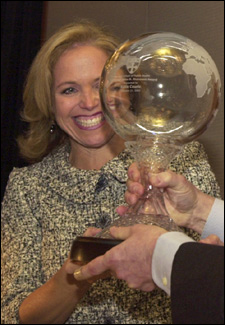School of Public Health honors Couric
After tragedy, TV host takes up cause of colon cancer

Katie Couric, one of the most recognizable faces on television, accepted an award from Harvard’s School of Public Health (SPH) Tuesday (Oct. 21) for work that she said is more important to her than her daily interviews with newsmakers and stars.
“Of all my professional accomplishments, my work with colon cancer has been by far the most meaningful to me,” Couric told the SPH’s new Leadership Council as she accepted the Julius B. Richmond Award at a lunch at the Charles Hotel. “In a media that pays more attention to what’s on my head than what’s in it, and focuses more on my footwear than the journey I have taken, I am overwhelmed and grateful that you have recognized my efforts in this area.”
Videos of remarks by Katie Couric, President Summers, and Dean Bloom:
http://www.hsph.harvard.edu/leadership/
The award, named for John D. MacArthur Professor of Health Policy Emeritus Julius B. Richmond, is the School’s highest honor; since 1997 it has gone to an individual who has promoted and achieved high standards for public health. Couric was recognized for mobilizing her prominent public position to communicate and educate about colorectal cancer, which claimed her husband’s life in 1998, and to advocate for colonoscopies.
“She transformed her personal tragedy into a public cause to make millions more aware of the toll of colon cancer, to help them learn how relatively easy it is to screen for colon cancer,” said SPH Dean Barry Bloom. Couric, co-anchor of NBC’s “Today” show for 12 years, demystified the screening exam for colon cancer by undergoing a colonoscopy – on national television – in an acclaimed “Today” series called “Confronting Colon Cancer.” The program has continued to report on the disease.
The fruits of Couric’s labors are significant and measurable, said Bloom. A University of Michigan study found that since her focus on colorectal cancer, the number of colonoscopy screenings has risen almost 20 percent in what researchers call “the Couric Effect.”
Taking the bully pulpit
Pausing to fight back tears, Couric shared the details of her husband’s nine-month battle with colon cancer and the impact his death had on her and her young daughters. “Despite his grace, humor, and his will to live, my husband Jay Monahan collapsed on the bathroom floor on Saturday, January 24, 1998, and died,” said Couric. He was 42 and lived a healthy lifestyle.
Enduring the loss in the glare of the public eye was, she said, “excruciating,” but she persevered to turn her pain into public awareness. “As war-weary and devastated as I was, I felt compelled to share my newfound knowledge,” said Couric. “With the built-in bully pulpit on a national stage and millions of viewers, I thought it would be downright criminal not to.”
Colorectal cancer, the number two cancer killer after lung cancer, affects 130,000 Americans per year. If detected early, its cure rate is 92 percent, but few people take advantage of colonoscopy, which Couric called the “gold standard” screening procedure.
In addition to launching the National Colorectal Cancer Research Alliance, which has raised $15 million for research, Couric made herself the poster girl for colonoscopies with the March 2000 “Today” series that charted her own experience with a colonoscopy. “I got up close and personal to take the fear and embarrassment out of the procedure and to explain to people that it really isn’t that bad,” she said. “I always say, it’s a lot less painful than being diagnosed with colon cancer.” The series was honored with a prestigious George Foster Peabody award.
Displaying the charm so familiar to her early-morning audiences, Couric expressed her support for the Red Sox and her thrill at speaking to graduates of the “University of Virginia of the North,” a nod to her own alma mater. Her respect for the faculty members and public health professionals in the audience was genuine, however; of all the stories written about her efforts on behalf of colon cancer screening and research, she said, none was more satisfying than the Journal of the America Medical Association report that described “the Couric Effect.”
Cheerleading from the top
The presentation of the Julius B. Richmond Award to Couric capped the inaugural meeting of the SPH Leadership Council, a gathering of members of the School’s smaller advisory councils and other individuals who offer expertise and support to the School. Dean Bloom updated the audience with an impassioned statement of the School’s mission and a call to action to address several imminent public health concerns.
In the luncheon’s keynote speech, Harvard President Lawrence H. Summers lauded public health’s success in eradicating death and disease in some of the world’s most vulnerable populations.
“There is no other area of human endeavor in which the application of thought and resources can make so profound a difference in as many people’s lives as can the work of public health,” he said.
“This is a not a field where we’re hoping for a breakthrough,” Summers added. “This is a field where we know how to allocate thought, allocate resources, and as a consequence, save lives.”




